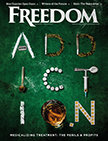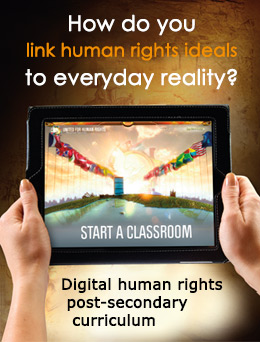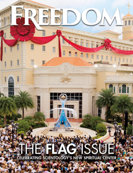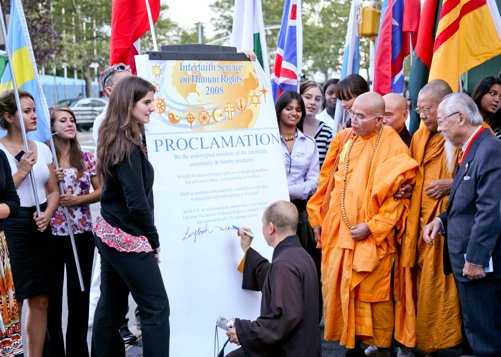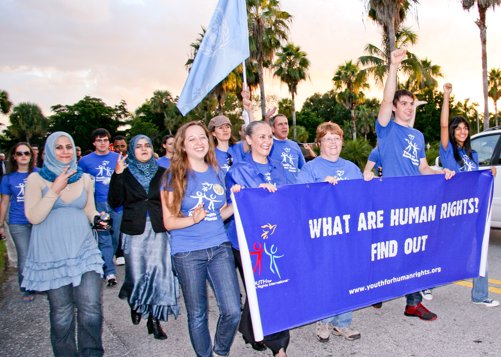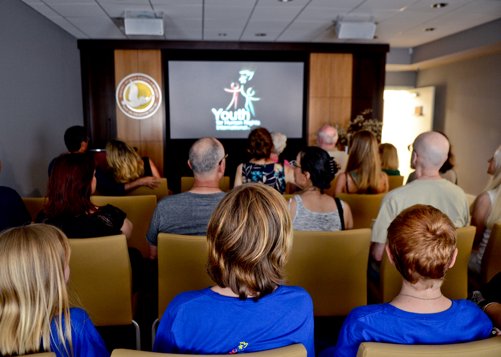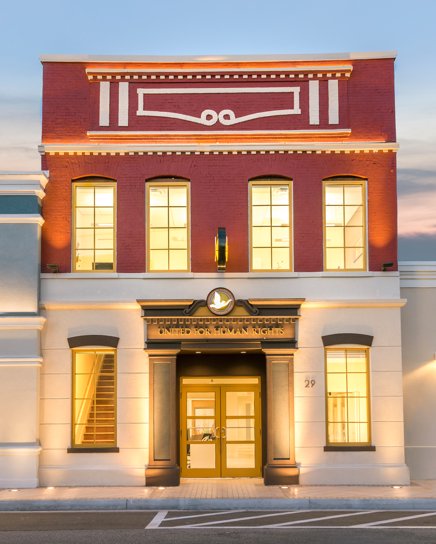
Following the deadliest conflict in history—World War II, which claimed an estimated 80 million lives including up to 55 million civilians—world leaders sought to bring about changes that would prevent such wholesale carnage and atrocities in the future.
So, in April 1946, less than a year after the war ended, an 18-member commission chaired by Eleanor Roosevelt was tasked with drafting a document that would for all time memorialize and safeguard the inherent rights of all people—an international bill of human rights.
In December 1948, leaders from 48 countries gathered in Paris and adopted what is now recognized as the world’s preeminent human rights document and one of the most important accomplishments of the 20th century—the United Nations Universal Declaration of Human Rights. Each of its 30 articles delineates a specific right. The preamble states, “recognition of the inherent dignity and of the equal and inalienable rights of all members of the human family is the foundation of freedom, justice and peace in the world” and notes that disregard and contempt for those rights “have resulted in barbarous acts which have outraged the conscience of mankind.”
In 1969, Scientology Founder L. Ron Hubbard reprinted the Universal Declaration of Human Rights in Freedom. He wrote, “The United Nations came up with the answer. An absence of human rights stained the hands of governments and threatened their rules. Very few governments have implemented any part of the Universal Declaration of Human Rights. These governments have not grasped that their very survival depends utterly upon adopting such reforms and thus giving their people a cause, a civilization worth supporting, worth their patriotism.”
Throughout the history of the Scientology religion, its members have stood for the rights of all men, women and children to freedom, equality and justice. Indeed, such concepts are integral to the Church’s Creed. And through support of the nonprofit, nonreligious organizations United for Human Rights and Youth for Human Rights, Scientologists work with government agencies and nongovernmental organizations on six continents to raise awareness of the Universal Declaration of Human Rights and bring about its implementation, with global awareness of and respect for the inalienable rights of every person.
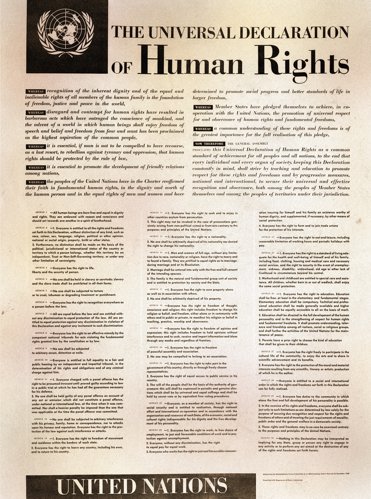
Attacks on human rights are an international problem. Almost 21 million people are victims of forced labor, 11.4 million of whom are women or girls. Globally, children now comprise nearly one-third of all detected trafficking victims. More than 4.5 million people are victims of forced sexual exploitation. Forced labor in the private economy generates $150 billion in illegal profits per year.
United for Human Rights and Youth for Human Rights constitute the world’s largest nongovernmental campaign for human rights, partnering with more than 1,700 groups and organizations, and working in 192 nations to make human rights a reality.
Principles embodied in the Universal Declaration are now enshrined in the Constitution of Mexico, with Youth for Human Rights (YHR) a key contributor to the nationwide effort that brought about that accomplishment. YHR’s multimedia campaign included petition drives, marathons, rock concerts, hundreds of human rights seminars in schools and universities, public service announcements that reached millions, and massive distribution of booklets containing the Universal Declaration of Human Rights.
Similar campaigns have rolled forward in communities and nations the world over, with a wide range of events and activities focused on bolstering human rights awareness. Vital to the effort are unique and award-winning educational materials, produced in 17 languages, which each year reach more than 100 million people with messages about the importance of making human rights a global reality.
4.1 M United for Human Rights informational booklets distributed advocating global human rights education
These tools include The Story of Human Rights, a film that defines human rights and presents the compelling story of their history and development; The Story of Human Rights booklet, providing an overview of the subject; 30 public service announcements—one for each of the articles in the Declaration—for use in classrooms or for airing on television or in airports, sports stadiums and other venues; posters depicting each article of the Declaration; and Educator’s Guides—comprehensive packages containing lesson plans, vital human rights documents, complaint procedures, a list of human rights agencies, and more, including copies of the film, PSAs and booklets.
1,700 organizations partnered with United for Human Rights internationally
One result of the worldwide educational effort has been establishment of Youth for Human Rights annual summits, held at the United Nations in New York and in Geneva, Switzerland, which have nurtured and encouraged a legion of young human rights advocates who, in turn, today lead hundreds of YHR chapters across the globe.
One of these youths, Rahul KC, received the Human Rights Hero Award at a YHR International Summit in recognition of what he has done in his native Nepal, a land long plagued by human rights abuses. The team he organized has regularly conducted educational sessions throughout the country in schools and universities, reaching an estimated 30,000 students, while also providing literature on human rights to 25,000 members of Nepal’s Armed Police Force.
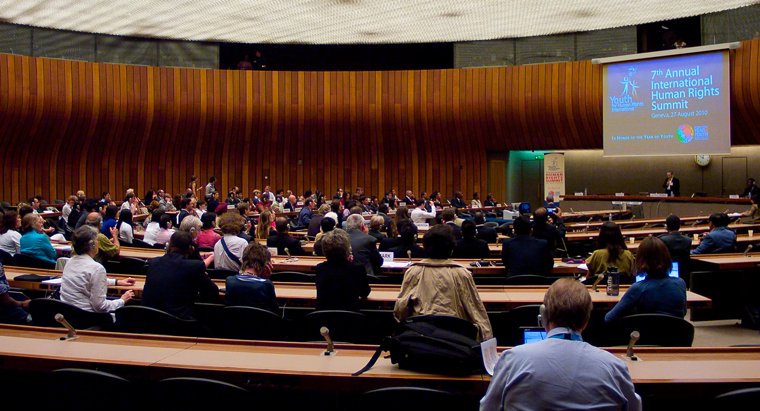
In neighboring Tibet, years of repression and torture by Chinese military forces brought about the death of hundreds of thousands and the destruction of some 6,000 monasteries. Multitudes fled—estimates say more than 100,000 exiles now live in India alone—and today many of them campaign to bring human rights back to their country. Tibet’s spiritual leader, His Holiness the Dalai Lama, provided a personal prayer to be included in Tibetan versions of What Are Human Rights? booklets.
30 public service announcements for the 30 articles of the Universal Declaration of Human Rights
The Universal Declaration of Human Rights, he wrote, “establishes the fundamental equality and rights of all people on this planet, irrespective of their race, color, creed, or whether they are believers or not. We should all show due respect to this Declaration and abide by its provisions. I am grateful and happy that the [YHR affiliate] has arranged to translate this important document into Tibetan and is now also publishing it in book form to distribute it among Tibetan youth.”
1,300 TV stations in 115 countries have aired United for Human Rights’ public service announcements
In West and Central Africa, long the site of ethnic strife and civil wars that claimed the lives of millions, teams of YHR volunteers conducted extended tours to educate youth on the Universal Declaration of Human Rights and to establish human rights programs in Liberia, Sierra Leone, Ghana, Togo, Ethiopia and Cameroon. These youth-driven programs have empowered students as human rights advocates and researchers who investigate and document the experiences of child soldiers, amputees, rape victims, and others—all with a view of preventing such horrors in the future. Agreements for educational collaboration on human rights issues now exist between Youth for Human Rights and authorities in those six nations.
In a letter to Youth for Human Rights, one of the many supporters of the educational effort, Liberian Vice President Joseph Boakai, wrote, “Liberia’s future depends on enabling our young people to assume ethical and responsible leadership based on human rights principles. By your remarkable learning tools … and by your challenging student projects designed to place youth in leadership roles within their communities, Youth for Human Rights International and its Liberia chapter are important voices in Liberia’s human rights education process.”
In Colombia, a nation once rife with abuses that included torture and hundreds of extrajudicial executions carried out by rogue soldiers, a sea change occurred when all military personnel studied these educational materials, with human rights complaints against members of the nation’s armed forces dropping 96 percent.
And so it has been in similarly troubled regions, from nations like Timor-Leste to cities such as Johannesburg, South Africa—human rights education implemented by Youth for Human Rights and United for Human Rights has brought dramatic and life-saving changes.
Given the scope of today’s human rights challenges, as evidenced by a cursory scan of any daily newspaper or even a few minutes of network news, the need for education and action is urgent in communities everywhere.
In announcing the July 11 opening of a new United for Human Rights center in downtown Clearwater, David Miscavige, Scientology’s ecclesiastical leader, said, “It is true Clearwater is a beach city and South Florida is a vacation destination for tens of thousands. But it is also darkly true that this region is not immune to human rights abuses—the same abuses that plague communities worldwide.”

In Florida, some 40,000 people are trafficked through the state each year, most of them coerced into lives of prostitution and many of them unaware of their rights under the Declaration, Article 4 of which states, “No one shall be held in slavery or servitude; slavery and the slave trade shall be prohibited in all their forms.”
To help combat this in the Tampa Bay area, United for Human Rights/Youth for Human Rights volunteers have distributed more than 20,000 booklets informing people of their rights and how to find help.
News of the opening of the new United for Human Rights center in Clearwater brought this response from Ida Lopez, manager for Human Trafficking Victims for World Relief, Tampa Area: “Many people are not aware that there are human rights violations right here in Pinellas County and they occur daily: human trafficking, discrimination, domestic violence, maltreatment of children.
“I strongly feel human rights education should be incorporated into our children’s curriculum. They must know their human rights to be aware of human rights violations. If that was the case, we would have a society changed for the better.
“It’s wonderful that you are opening your office, as your office will attract many—education tourism. Not only will you engage and educate them, they will want to participate. And that is the best of all.”

